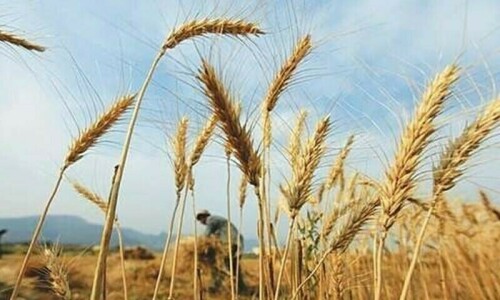ISLAMABAD: The Economic Coordination Committee (ECC) of the cabinet on Tuesday approved 400,000 tonnes of additional wheat procurement by the Centre, allowed the import of 200,000 tonnes of urea, and sanctioned about Rs144 billion in supplementary grants.
However, the ECC meeting, presided over by Finance Minister Muhammad Aurangzeb, did not immediately allow the supply of subsidised gas to domestic urea manufacturers. According to relevant ministries, this could have facilitated about 600,000 tonnes of local production — about 445,000 tonnes in Punjab and 165,000 tonnes in Sindh.
An official statement said the ECC approved an increase in the wheat procurement target for Passco — the national agency that maintains strategic food stocks — from 1.4 million to 1.8 million tonnes, along with the required cash credit limit (about Rs41.5bn) to purchase additional quantity.
The approval would help Passco scale up its ongoing wheat procurement drive. The prime minister had already announced that Passco, a federal entity, would purchase an additional 400,000 tonnes from farmers after the Punjab government did not intervene amid raging farmers’ anger.
Allows import of 200,000 tonnes of urea, okays Rs144bn in grants
The ECC also approved the import of 200,000 tonnes of urea fertiliser to meet the requirements for the 2024 kharif season as proposed by the Ministry of Industries and Production, the statement said. The ministry was also directed to continuously assess the urea demand and supply situation and suggest appropriate measures to the ECC in a timely manner.
The committee also approved the Ministry of Industries and Production’s request to disburse salaries of Pakistan Steel Mills workers for six months (January to June 2024) and directed the ministry to present a detailed plan and timeline for the future use of the PSM assets.
The ECC also allowed a power division’s request to release budgeted expenditures to clear the arrears of tariff differential subsidy of Rs70bn for K-Electric and Rs55bn for Azad Jammu and Kashmir. This would help ease the power sector’s liquidity requirements.
The ECC also authorised the BISP cash transfer programme to arrange funds from its allocated budget for financing the Special Relief Package for Daily Wage Workers on the Chaman Border, highlighting government support for the vulnerable group.
The committee also approved supplementary grants, including Rs4.8bn for the Pakistan Atomic Energy Commission, Rs5.8bn for the erstwhile Earthquake Reconstruction and Rehabilitation Authority to clear matured liabilities of the contractors, and Rs3.2bn to the finance division as rupee cover for the World Bank-funded Financial Inclusion and Infrastructure Project (FIIP).
Moreover, the ECC approved a Rs162m grant for the Ministry of Housing and Works to repair and maintain public buildings in Islamabad, and Rs2.2bn for the Ministry of Interior to rehabilitate ex-Fata’s temporary displaced persons.
Published in Dawn, May 8th, 2024

















































Dear visitor, the comments section is undergoing an overhaul and will return soon.